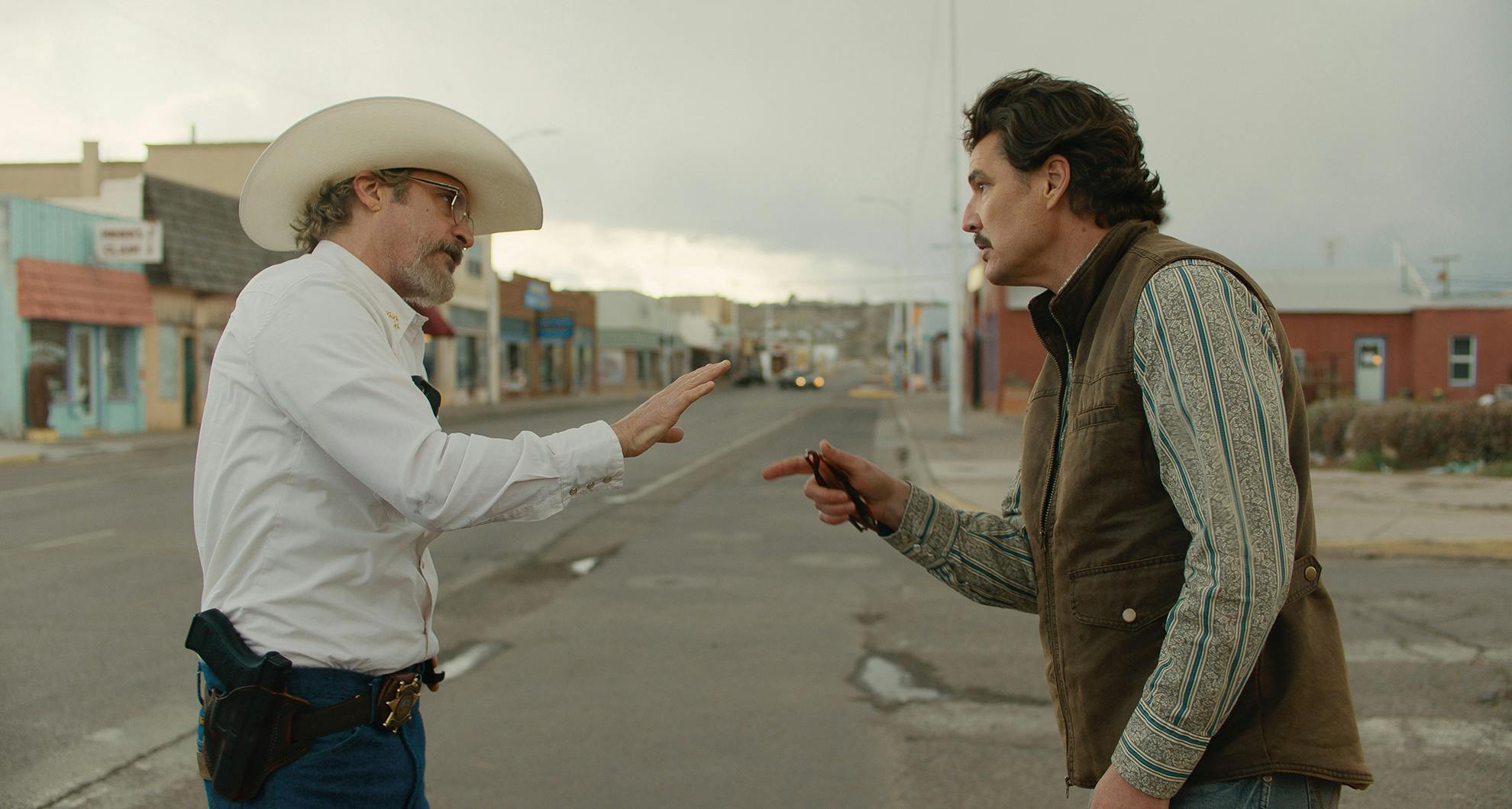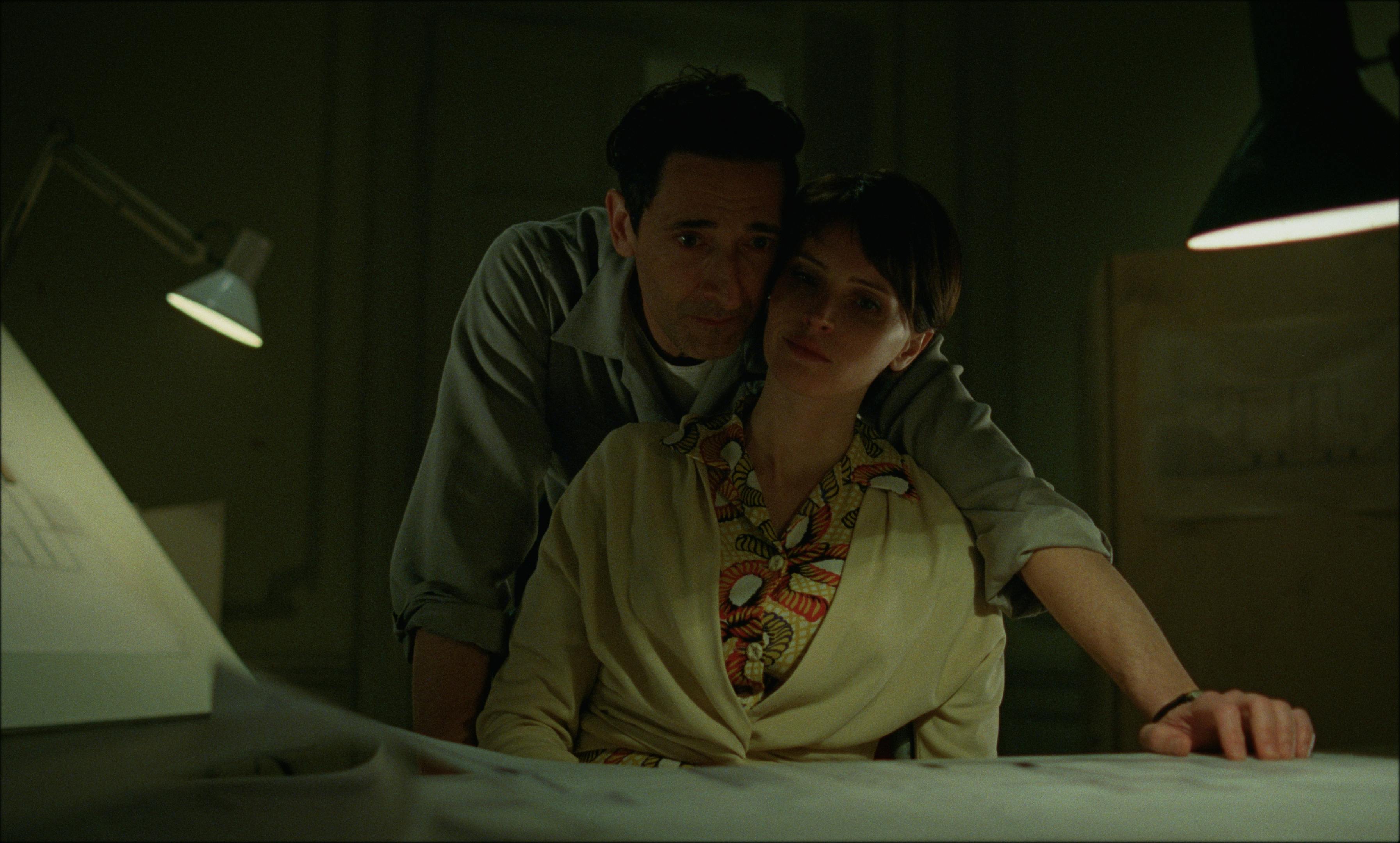“It’s about a data center,” is the consistent refrain we hear from writer-director Ari Aster on the press tour for his latest film, Eddington. There’s a knowing cheekiness to the remark, which references a plot point that recedes to the background of his pandemic-set neo-western –but that feels like the point.
Aster’s fourth feature takes place in May 2020; a few months after the start of the pandemic, many months before the introduction of COVID vaccines, and just as the Black Lives Matter movement exploded. It was the end of the first Trump administration, where the political polarization seemed to ossify and misinformation fragmented Americans’ perception of the world around them.
Eddington evokes the specificity of that very specific time. While heightened like any good satire, Aster uses those specifics to reflect the moment back to us while commenting on how ridiculously our fractured culture responded to and exploited the pandemic. And like the Coens’, though much more cynical, Aster employs his confident idiots to depict how stupid we can be sometimes.
In the small, dusty town of Eddington, New Mexico, Sheriff Joe Cross (Joaquin Phoenix) finds himself at odds with nearly everyone around him. Like many of us did, Aster uses COVID as a litmus test for his characters. Cross immediately announces himself as someone who doesn’t think the coronavirus is a threat to his tiny town and believes that masks are useless and ineffective. As an audience, we understand the shorthand Aster is using which he also applies to Cross’s rival, Eddington mayor Ted Garcia (Pedro Pascal), a centrist Democrat who is running for re-election.
Cross feels out of step with the town, who largely abides by the safety protocols of the day: masking-up in public, social distancing, etc. But these precautions resulted in ethically complex situations average Americans encountered in-person but perhaps more so, online. Our supermarkets, coffee shops, and mass transportation became battlegrounds with a captivated audience.
When America was quarantined in their homes, social media was a window to the outside world. Unfortunately, much of that view was sordid and distressing, but from the comfort of our couches we watched viral videos of arguments, tantrums, and fights that would erupt from disputes that stemmed from contradictory understandings of the pandemic.
These quotidian conflicts are illustrated in an early scene where a supermarket refuses to allow an elderly man into the shop without a mask, despite his difficulty breathing while wearing one. With masked shoppers recording the interaction on their phones, Cross forces the supermarket to let the man shop without a mask, ruling the requirement is a guidance, not a law.
Social media informs much of Eddington. Aster presents it as a poisoned well, a source of malevolence from which no good can come. At the time of the pandemic, Aster created several social media accounts, each presenting and engaging in differing political views. Thanks to content algorithms, each account was enveloped in its own echo chamber from which the user couldn’t break free, no matter how hard Aster tried. These digital environments are the breeding ground for our society’s fractured perceptions of truth. Reality had become political.
It felt as if the pandemic stopped the world from spinning, throwing humanity off-balance. The status quo, a comfort we all subconsciously hold so dear, had been vanquished. The world was thoroughly unprepared for a global pandemic and in the vacuum of certainty, we were left raw and panicked. The traditional voices of informational authority were nearly drowned out by the growing chorus of firebrand prophets.
Cross lives with his sickly wife Louise (Emma Stone) and conspiracy-pilled mother-in-law Dawn (Deirdre O'Connell), who is constantly printing out articles online to share. Louise is downbeat and drained, moping around the house making unusual dolls she sells online. She’s clearly very important to Cross who wants to have a child but Louise is less interested. She becomes incensed when Cross announces his run for mayor against Garcia in an online video, where Cross has found validation and momentum.
Prior to COVID, the motivated forces of media-savvy charlatans had already begun to pound their desks in front of green screens, god, and YouTube, disseminating fearmongering narratives that would make the New York Post clutch its pearls. Conspiracies about false flag operations were served to unassuming masses who were probably just looking for a video on how to replace their faucet. Videos of red-faced tirades on the ills of a tyrannical Liberal culture became a beacon to a large part of the population who had already lost faith in their institutions. Their soft fists of sanctimonious indignation implausibly began to leave hairline cracks in the foundations of our society, our beliefs, and our trust …then came COVID.
Child sex trafficking became a cause du jour for the conspiracy-minded media. Pizzagate was a high-profile example of the far right-wing painting Democrats as elitist pedophiles while positioning themselves as pious crusaders protecting the most vulnerable. Aster’s avatar for the cause is Vernon Jefferson Peak, a charismatic cult leader figure played effectively by Austin Butler. After Louise and Dawn attend one of his events, they bring Vernon back to their house for dinner. While Cross is uncomfortable around the charming Vernon, the only time we see Louise smile is in his presence. He’s won her over enough for her to reveal she’s been the victim of sexual abuse as a child. She doesn’t share the full story, a fact that adds further insult to injury for Cross and pushes the gap between the two further.
Out of pure desperation and stupidity, Cross exploits Louise’s story and names Garcia as her abuser at a campaign event. Which Louise publicly denies and then leaves Cross for Vernon. It’s here where Cross begins to unravel and is sent spiralling further after he responds to a noise complaint at Garcia’s house where he’s having a party. After refusing to turn down the music, Garcia slaps Cross several times in front of the guests. The emasculated Cross does nothing in response and sheepishly walks out. Cross's beef with Garcia has little to do with data centers, political beliefs, or public health policy. Cross doesn't like Garcia because he thinks he fucked Louise, as does everyone in town. Aster also applies the “men doing stupid shit over women” motivation to the younger generation.
Brian is a nice but shy young man who has a crush on local woke queen Sarah, presented as the textbook ‘social justice warrior.’ To win her favor, Brian does some research (Google) and adapts the SJW persona. With Brian, Aster illustrates that like many at the time, Brian doesn’t truly understand the theory he’s espousing. His preaching of white guilt to his parents ends in an unceremonious punchline and during a speech he’s giving about Eddington’s native provenance he unironically states, “I shouldn’t even be speaking right now!”
Just as the proliferation of coattail-riding right-wing personalities online flourished, so did many on the left become faux-expert race theory pundits. They’re not inherently political, but, rather, use politics and ideology as a tool. They speak with conviction as idealogues but have no true ideology other than self-interest; thriving on outrage and adapting to whatever will curry them the most favor like cultural chameleons.
It's not about the disease. It's not about social justice. It's not about wearing masks. It's not about identifying one's privilege. It's about the performative nature of reacting to it all. Just like the ineffective but self-satisfying black squares posted to Instagram in support of Black Lives Matter, which Aster is sure to include in a tongue-in-cheek transition. It's for likes, followers, clicks, voters, kisses. It's a facade for attention. It's about self-interest and ego. And, ultimately, in the microcosm of Eddington, that’s what the game is all about.
While the quarantine portion of the pandemic is years behind us, we are still living in its wake. With the federal government now lousy with right-wing media personalities, we see who has best exploited the chaos of the time. Just as former hosts moved from in front of the lens to lead the FBI and the Department of Defense, Aster reflects the unjust victors to reward those who are least deserving.
Coming to Cross’s aid during the film’s gun battle denouement is Brian, who shoots the final assailant all while recording video on his phone. His trigger-happy moment turns him into a popular conservative influencer, resembling the rise of Kyle Rittenhouse.
Cross is severely injured but becomes a hero and wins the election. He’s left wheelchair-bound and unable to move so the conspiracy-minded Dawn steps in as his steward and de-facto mayor of Eddington. In an ironically happy ending, reminiscent of Robert Altman’s The Player, Cross and Louise live together in a luxurious house where they all sleep together in an enormous bed along with a male caretaker who doubles as Dawn’s younger lover. Unable to speak, we watch as Cross catches Louise on television as she beams brightly on stage at Vernon whose child she’s now bearing as he speaks to a large crowd of supporters.
It’s a pitch black button on the film but as Cross is the protagonist, there’s a sympathy we hold for him and even an empathetic connection as he sits there helplessly looking on at the world around him. The final image of the film is a static shot of the data center, which lingers on into the credits. While it doesn’t get returned to enough to effectively present as this dark figure looming in the background, it’s a solid punctuation that represents the other big winner of all the chaos and polarization: Capitalism.
White identifying as politically left, Aster doesn't pander to one side or the other with his incendiary film; a neutrality for which he’s been criticized. At a time where media companies are kowtowing to the current presidential administration, it’s a brave statement to make; especially knowing he’ll have to take on a press tour when it’s released. Without the security of taking a side, Aster is “a lone reed. Standing tall, and waving boldly in the corrupt sands of commerce,” as famed fictional journalist Frank Navasky would say.
He also doesn’t offer many, if any, answers. Another criticism levied at Aster but one indicative of the problem with politically-charged online media. It’s nothing but answers. They’re all wrong but it doesn't make the viewer do much work. They’re pre-packaged, pre-chewed messages ready for regurgitation and sanctimonious masturbation. Aster wants his film to be inscrutable. It’s much like those days of the pandemic: unknowable at the time, and it’s still pretty unknowable now.






